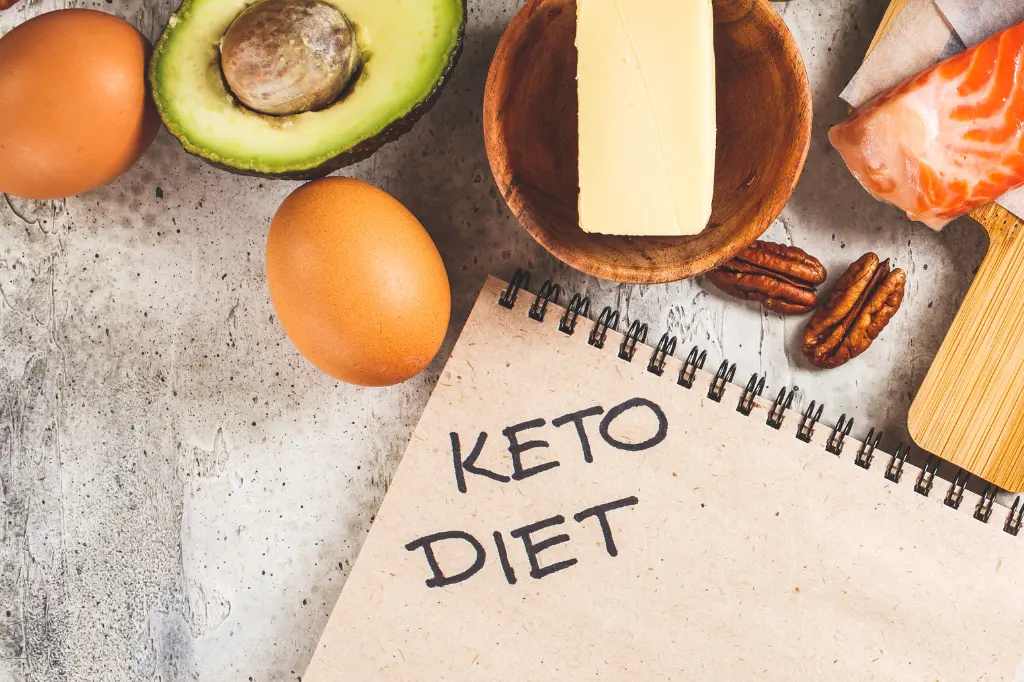Changes are not going to happen overnight. It requires time, passion, and hard work. Many individuals embrace new eating habits or diets to reduce weight. The science behind weight reduction is eating fewer calories per day than you burn.
However, dieting approaches give a precise structure that might help reduce your daily caloric intake more manageably. You have to wait for a minimum period to reduce your weight from the keto diet.
I started the keto diet couple of years back before preparing for marriage to reduce 8 pounds. I assumed that losing 8 pounds would be simple if the ketogenic diet was as effective as advertised. I realized one could get the best results if one kept patience.
Are you interested to know how long does it take to get results from the keto diet? You must read this article until the end to get the best answer.

Table of Contents
How Does Keto Diet Work On Your Body?
The ketogenic diet is a process of reducing weight by using fat-burning. The objective is to reduce weight rapidly and eventually feel fuller with fewer cravings while enhancing mental concentration and energy.
A substantial decrease in carbohydrate consumption characterizes keto diets. By drastically lowering carb intake, one may induce a metabolic condition called ketosis.
Your body’s ability to use fat as fuel will be at its maximum in this condition. In addition, it may use liver fat to produce ketone bodies, providing a source of fuel for the central nervous system.
Why Is Keto Beneficial For Achieving Weight Loss Goals?
Diets based on the ketogenic model are a valuable process for achieving weight loss goals and reducing the danger of developing certain illnesses. The Keto diet reduces weight and illness.
People use low-fat diet techniques for weight reduction; evidence proves that a keto is a preferable option. The ketogenic diet lowers the risk factors of coronary heart disease, including cholesterol, body fat, and blood sugar.
A more significant amount of ketones in the blood may help suppress hunger. Others prefer keto since it enables them to eat “off-limits” things like bacon and guacamole. The important thing is to stay fit within their nutritional goals.
Disadvantages Of The Ketogenic Diet
Carbs are the body’s primary energy source which makes ketogenic diets challenging. Long-term carbohydrate restriction will likely result in fatigue and cravings for rich meals.

Carbohydrates, like fiber, vitamins, and minerals, also include critical micronutrients that are difficult to get from other kinds of food. Hypertension, cardiovascular issues, and heart disease are some long-term consequences of a high-fat diet.
Due to low carbohydrate consumption and high fat, keto becomes challenging to maintain for a long time. A Keto diet is not suggested for liver patients. The liver converts fats into energy. Fat overload might increase liver disorders. Additionally, carbohydrate deficiency affects brain function. Many keto dieters experience memory loss.
How Much Weight May Be Lost When Following A Ketogenic Diet?
Weight loss during keto diet depends on your unique objectives and physique. Due to our bio-individuality, there is no “average” or “normal” weight reduction.

Your pace of weight reduction is influenced by variables such as your initial weight, age, height, percentage of body fat, amount of physical activity, and previous diseases that might affect your metabolism. Cameron suggests aiming for an average sustained healthy weight loss of one to three pounds each week.
Keto Weight Reduction After One Week
During the first phases of the keto diet, many individuals lose weight rapidly due to water loss. People often lose between two and ten pounds in the first week.
Consuming fewer carbohydrates reduces insulin levels, allowing the kidneys to excrete extra salt. Drew Manning, a specialist on the ketogenic diet, states that clients often lose between one and five pounds in the first week.
Keto Weight Reduction After One Month
“For the first month on keto, if individuals maintain a calorie deficit and stick to the diet, the majority of people will likely lose 10 pounds or more,” adds Manning. After roughly a month, the body becomes more fat-adapted and more effective at burning fat as fuel.
According to Dr. Seeman, the typical weight reduction for her patients over the first month is 10 to 12 pounds. She states it’s essential to persist with the diet for a while to train your body on how to burn fat instead of glucose. Electrolyte control is crucial throughout this time.
Results Of Keto Weight Reduction After 90 Days
“If the patient can sustain a consistent caloric deficit, I anticipate that they will lose one to two pounds each week,” says Dr. Seeman. So, her customers often lose 20 to 25 pounds after twelve weeks.
She notes, however, that it would depend on the starting body fat percentage of the patient. “As you approach your desired body fat percentage, your body will begin to adjust, and your weight reduction will stall,” she adds.
Symptoms Of Ketosis: How To Tell?

Headaches, Mental fog, exhaustion, nausea, poor breath, and extreme thirst are some of the “keto flu” symptoms that might occur while your body adjusts to ketosis. While these signs may help you know whether there is a switch, a ketone test is the most accurate method to determine whether you have entered ketosis.
Various Methods Of Checking Ketones
The easiest way to tell whether your body is in ketosis is to get your ketone levels tested. Ketones such as acetoacetate, acetone, and beta-hydroxybutyrate may be detected in the urine and breath.

You can monitor your acetoacetate levels using a ketone urine strip, which changes color from pink to purple based on the concentration of ketones in your urine. Urine with a darker hue often indicates a greater concentration of ketones.
A breath ketone meter, like the Ketonix, can detect acetone levels. This meter will display a hue corresponding to your current state of ketosis and your current ketone levels. Scientific research indicates that ketone breath meters are reliable.
Possible Causes Of A Slower Ketosis
Some people take more time to reach ketosis for several reasons. The time required to enter ketosis might vary depending on several variables, such as the individual’s age, metabolism, degree of physical activity, and existing carb and fat intake.
People fail to enter ketosis because they mistakenly consume more carbohydrates than are appropriate for a ketogenic diet. Consuming an excessive amount of carbohydrates might inhibit the production of ketones in the body.
Eating excessive protein when following a ketogenic diet may also slow the onset of ketosis by stimulating gluconeogenesis (the conversion of amino acids from protein into sugar).
When blood sugar levels are too high, the body stops making ketones. If you’re having trouble getting into ketosis, cutting your carb consumption, even more, may help.
What Information Is Necessary Before Starting Keto?
A person should have a comprehensive idea regarding the keto diet before starting the keto diet. Initially, persons on a ketogenic diet often lose a lot of weight quickly, perhaps as much as 10 pounds in two weeks or less.
The Keto diet can be harmful to some people. It is wise not to follow the keto diet as a fashion. Unknown health effects can pop up with the ketogenic diet.
Tips For Entering Ketosis
If you have difficulty entering ketosis, here are a few methods that might help:
● Consume 20-50 grams of carbohydrates every day. This may stimulate the production of ketones in the body.
● Track your carbohydrate consumption which may assist in guaranteeing that you consume 20-50 grams of carbohydrates each day, and do not underestimate your consumption.
● Limit your restaurant visits. While there are several keto friendly eateries, dining might make it more challenging to check your carbohydrate intake.
● Be careful of hidden sources of carbohydrates. Many sauces include a significant amount of carbohydrates.
● Increase your consumption of healthy fats. Between 55 and 60 percent of your daily calorie intake is recommended to come from nutritious fats, like those found in meats, avocado oil, nuts, and eggs.
● Try fasting intermittently. Intermittent fasting may assist the body in shifting its fuel source from carbohydrates to fat while maintaining energy balance.
● Exercise more. According to studies, exercising while fasting might raise ketone levels.
● Regularly test your ketone levels. Ketone testing may help you determine if you are in ketosis, allowing you to change your diet appropriately.
Tips To Achieve Ketosis Quickly
One can not accurately say how long does it take to get results from the keto diet. To achieve ketosis, you must first deplete your glycogen stores.
The ketogenic diet facilitates this by restricting daily carbohydrate consumption to fewer than 50 grams. That is almost similar to the number of carbohydrates in two giant apples.
After two to seven days of carbohydrate restriction, your body should begin using fat stores for energy. However, this may vary from person to person and take a little longer. These are some methods for accelerating the process:
Exercise: Physical exercise is fueled by carbs and will accelerate the depletion of glycogen stores. It is helpful to do physical exercise to get quick results from the keto diet.
Avoid Supplements: Supplements such as keto tablets promise to accelerate the onset of ketosis, although early research indicates otherwise. Therefore, you should avoid keto tablets to get results from the keto diet.
Frequently Asked Questions
Many questions can pop up in your mind regarding how long does it take to get results from the keto diet. I will answer some questions to reduce your confusion.
1. How quickly do you notice keto results?
The first two to six weeks are practically the ketogenic adaptation period when your body is going through the transition. You need to follow the diet for a minimum of three months.
2. How can I know if keto is working?
Ketones in the blood are perhaps the clearest indicator of a person’s ketosis. Doctors may also check for ketone levels using urine and breath tests, although they are less accurate than blood samples.
3. How much weight can I lose during the first week of the keto diet?
People report losing 1 to 10 pounds in the first week (5 kg).
4. How to accelerate keto weight loss?
Greens, broccoli, peppers, and mushrooms provide minerals and fiber to recipes. To lose weight on a keto diet, eat fresh, natural foods and limit processed items.
5. Why isn’t ketosis helping me lose weight?
Too many carbohydrates are one reason keto dieters don’t lose weight. They don’t care about carbs.
6. How long do I follow keto?
You have to follow a keto diet for 3 to 6 months. Dietitians advise that overuse might cause vitamin deficits.
7. How much water should keto dieters consume?
Generally, people should split their body weight in half and consume that many ounces of water daily. For example, if your body weight is 140 pounds, you must consume 70 ounces of water daily. Because the ketogenic diet modifies the body’s water and electrolyte balances, this quantity may be higher for a keto dieter.
8. Do you regain weight after quitting keto?
You will naturally gain a few pounds when you quit the keto diet. The goal is to choose nutritious, whole carbohydrates that won’t trigger massive blood sugar rises.
Final Thoughts
The ketogenic diet is not suitable for everyone; however, it may be helpful for short-term weight reduction objectives. In general, entering ketosis should take between 2 and 4 days. However, some individuals may need a week or more.
Getting results from a keto diet relies on various variables, including age, metabolism, and degree of activity. Monitoring ketone levels by breath, urine, or blood are the most reliable method for determining whether you are in ketosis.
I hope you get a comprehensive idea of how long does it take to get results from the keto diet. You can consult a doctor or dietician to get more knowledge about it.
